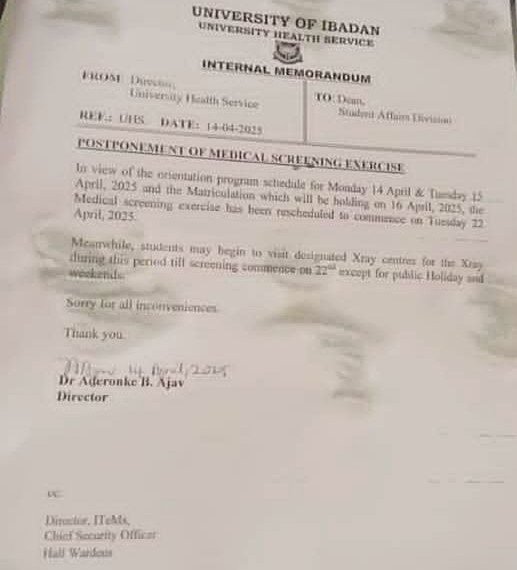The administration of the University of Ibadan has expressed worries regarding the rising number of female students participating in egg donation as a means of earning money.
In a memo dated April 15, 2025, the University Health Service cautioned that while egg donation has provided hope to numerous families facing infertility challenges, it should not be regarded as a long-term income source or a secondary job.
The internal memo was authored by Dr. Aderonke Ajayi, the Director of the University Health Service.Ajayi voiced concerns about the escalating trend within the university community that involves the recruitment and involvement of female students as egg donors for In-Vitro Fertilisation, often facilitated by individuals, agents, or organizations.
She clarified that egg donation necessitates the administration of hormonal medications to stimulate the ovaries, a procedure that presents various short-term health hazards.These health risks include abdominal discomfort, breast sensitivity, bloating, emotional fluctuations, and a condition referred to as Ovarian Hyperstimulation Syndrome.
Related News
- UI begins Final Year Undergraduate Clearance at Admission Office
- UI Releases 2024/2025 Fees Payment Guide for Freshers & Returnees
- UI School Fees for Freshers 2024, Returning Students, and New Academic Calendar
There is also a risk of infections, bleeding, ovarian torsion, injury to internal organs like the bladder and intestines, as well as psychological challenges.“It has been noted that a growing trend exists within the university community where female students participate in or are recruited as egg donors for in vitro fertilisation (IVF) by various individuals, agents, or organizations.“
Although egg donation has given hope to many couples undergoing infertility treatment, it is crucial to understand that it should not be viewed as a stable source of income or a substitute ‘side hustle’.
“Egg donation requires the use of hormonal treatments to enhance ovarian activity. This process involves numerous short-term health risks, such as abdominal discomfort, breast sensitivity, bloating, emotional swings, Ovarian Hyperstimulation Syndrome (OHSS), infections, bleeding, potential ovarian torsion, possible damage to the bladder, surrounding blood vessels, and intestines, along with psychological distress,” the director emphasized.
The specialist cautioned that some egg donors have experienced lasting effects, including the potential for reduced fertility, highlighting that current studies remain inconclusive regarding who can safely donate eggs and the number of times an individual can undergo this procedure.
Regarding safety, she recommended that egg donation should not exceed three times within a year, urging students to always opt for trustworthy clinics that adhere to appropriate medical standards and prioritize donor safety.“
It is essential for our students to be aware of the health risks and long-term effects associated with egg donation.
“We encourage everyone to proceed with caution and prioritize their health over monetary gains,” stated the memo.
The university urged community members to disseminate this information and safeguard young women from being exploited or misinformed about the associated risks of egg donation.





